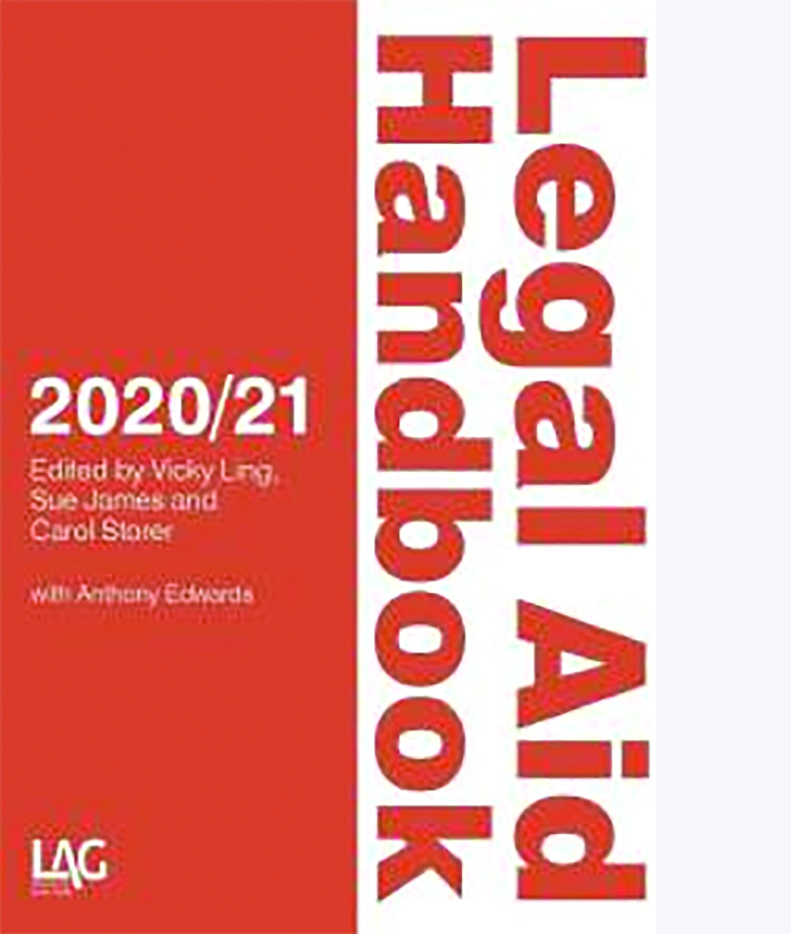
Editors: Vicky Ling, Sue James and Carol Storer, with Anthony Edwards
Publisher: Legal Action Group
ISBN: 9781912273898
Price: £60.00
Often described as ‘the bible on legal aid’, the latest edition of the Legal Aid Handbook represents an essential text for legal aid practitioners. Since the introduction of the Legal Aid, Sentencing and Punishment of Offenders Act 2012 (LASPO), the sources of legislation and guidance on legal aid matters has become increasingly diverse, and the Legal Aid Handbook has, accordingly, expanded in volume over time.
The 15 contributors to the handbook have a wealth of practical experience and this results in comprehensive guidance on all things legal aid. Since the introduction of LASPO, legal aid lawyers have seen their rates slashed and the areas of law in scope for legal aid significantly reduced. Being able to quickly work out whether the case is in scope and whether the client qualifies for legal aid at the outset of the case is crucial. Without detailed knowledge of the statutes, regulations and relevant guidance, legal aid practitioners run the risk of applications for legal aid being refused, bills being delayed or rejected, and contract breaches being made which can jeopardise the practitioner’s legal aid contract. In this context the Legal Aid Handbook is an invaluable one stop shop source of information.
The handbook is split into three main sections, the first of which covers the main phases of litigation in legal aid cases. The initial chapters provide crucial information about the legal aid framework and the issues that need to be considered at the point of taking on a legal aid case.
The chapter on the exceptional funding regime is a must read. Exceptional funding can be obtained in cases which fall outside of the scope of normal legal aid funding. At the time LASPO was introduced, much was made by the government of the possibility for applying for exceptional funding for cases that had been taken out of scope. However, the number of cases funded under the exceptional funding regime since 2013 has been remarkably low. In retrospect this is not hugely surprising. The funding process is time consuming, procedurally complex, and must be done at the risk of receiving no payment. It is not surprising that many legal aid lawyers have simply not been able to take the risk of spending significant amounts of time applying for exceptional funding with no guarantee of payment. However, following legal challenges made to the way in which the Legal Aid Agency (LAA) administer the system, it is probably fair to say that the prospects of making a successful application for exceptional funding have increased. This chapter provides clear and practical advice about how to go about making an application and the criteria that needs to be met. Distilling decades worth of human rights case law on Art 6 and Art 8 of the European Convention on Human Rights into one chapter is no mean feat!
The handbook goes on to provide expert guidance on the practicalities of running a legal aid case, and how to avoid numerous pitfalls, including how to navigate the intricacies of the LAA’s online application process, known as the Client and Costs Management System, or CCMS for short.
Given the wide ranging areas of law which can be funded with legal aid, the handbook helpfully devotes individual chapters to the all the main areas of law in which legal aid is available, before going on to provide guidance on the costing process in both civil and criminal law cases.
The bulk of the handbook (the first 464 pages) is taken up with the areas described above, and will be mainly of relevance to solicitors and other legal aid caseworkers. However, Section B deals with advocacy and provides detailed practical guidance on the ways on which advocates are paid for their advocacy in legal aid cases across a range of different types of legal aid funding. The handbook splits the guidance on this area into three broad sections: civil cases, family cases, and criminal cases.
While a clear and detailed understanding of the workings of the legal aid system is essential for the day to day practicalities of running a legal aid caseload, increasingly legal aid practitioners are subject to ever increasing scrutiny and assessment; peer reviews, LAA audits, key performance indicators, and legal aid tenders, to name but a few. All of these things are vital to the sustainability of a legal aid practice. Here the handbook will be of great value to a practice manager and senior members of a legal aid practice who have responsibility for compliance with legal aid contracts.
In the face of the ever increasing pressures involved with carrying out legal aid work, the Legal Aid Handbook can fairly be described as required reading for any legal aid practitioner.
Reviewer: William Ford, Osbornes Law (osborneslaw.com/).










